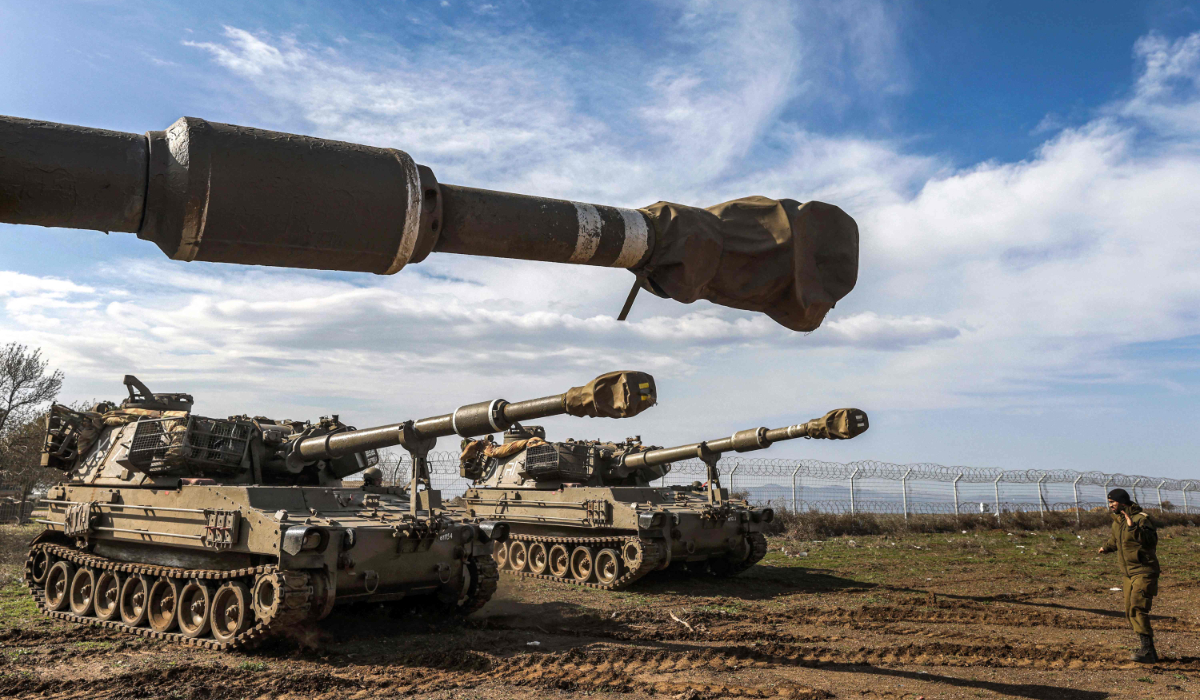BEIRUT: A deadly rocket strike in the Israeli-occupied Golan Heights has added to concerns that Israel and the Iran-backed Lebanese group Hezbollah could be sucked into a full-scale war — something they have both previously indicated they want to avoid but for which they have also said they are ready.
Israel said on Sunday it would strike hard at Hezbollah after accusing the group of killing 12 children and teenagers in a rocket attack on a football field in the Israeli-occupied Golan Heights. Hezbollah denied any responsibility for the attack on Majdal Shams, the deadliest in Israel or Israeli-annexed territory since Hamas’ Oct. 7 assault sparked the war in Gaza.
This is the background to hostilities between Israel and Hezbollah:
WHY ARE THEY FIGHTING?
Hezbollah began trading fire with Israel on Oct. 8, a day after the Palestinian militant group Hamas attacked communities in southern Israel and sparked the Gaza war.
Hezbollah, a Hamas ally, says its attacks aim to support Palestinians who are under Israeli bombardment in Gaza.
The Gaza war has drawn in Iran-backed militants across the region. Hezbollah is widely deemed the most powerful member of the Iran-backed network, known as the Axis of Resistance.

Israeli army M109 155mm self-propelled howitzers are positioned in the Israeli-annexed Golan Heights near the Syria border on January 2, 2023. (AFP file photo)
Hezbollah has said repeatedly it will not halt its attacks on Israel unless a ceasefire in Gaza comes into force.
While linked to Gaza, the conflict has its own dynamics.
Israel and Hezbollah have fought numerous wars.
The last was in 2006.
Israel has long viewed Hezbollah as the biggest threat at its borders and has been deeply alarmed by its growing arsenal, and the foothold it has established in Syria.
Hezbollah’s ideology is largely defined by conflict with Israel. It was founded by Iran’s Revolutionary Guards in 1982 to fight Israeli forces that had invaded Lebanon that year, and waged years of guerrilla war that led Israel to withdraw from south Lebanon in 2000.
Hezbollah deems Israel an illegitimate state established on occupied Palestinian lands and wants to see it gone.
WHAT’S THE IMPACT SO FAR?
The current conflict has already taken a toll on both sides.
Tens of thousands of people have been forced to flee their homes on both sides of the border. Israeli airstrikes have pounded areas where Hezbollah operates in southern Lebanon and struck the Bekaa Valley near the Syrian border.
Israel has also occasionally hit elsewhere, notably killing a senior Hamas commander in Beirut on Jan. 2.
Israeli strikes have killed some 350 Hezbollah fighters in Lebanon and more than 100 civilians, including medics, children and journalists, according to security and medical sources and a Reuters tally of death notifications issued by Hezbollah.
The Israeli military said after Saturday’s attack the death toll among civilians killed in Hezbollah attacks had risen to 23 since October, along with at least 17 soldiers. Hezbollah denied it was responsible for Saturday’s attack.
In Israel, the displacement of so many Israelis is a big political issue. Officials had hoped they would be able to go home for the school year beginning Sept. 1 but that has looked increasingly unlikely as the standoff has continued.
HOW MUCH WORSE COULD IT GET?
A lot. Despite the ferocity of these hostilities, this is still seen as a relatively contained confrontation.
Israeli Prime Minister Benjamin Netanyahu warned in December that Beirut would be turned “into Gaza” if Hezbollah started an all-out war.
Hezbollah has previously signalled it is not seeking to widen the conflict while also saying it is ready to fight any war imposed on it and warning that it has used only a small part of its capabilities so far.
Any move by Israel to expand the conflict would be met by “devastation, destruction and displacement” in Israel, Hezbollah deputy leader Sheikh Naim Qassem said in an interview with Al Jazeera in June.
Past wars have inflicted heavy damage.
In 2006, Israeli strikes levelled large areas of Beirut’s Hezbollah-controlled southern suburbs, knocked out Beirut airport, and hit roads, bridges and other infrastructure. Nearly 1 million people in Lebanon fled their homes.
In Israel, the impact included 300,000 people fleeing their homes to escape Hezbollah rockets and some 2,000 homes destroyed.
Hezbollah has a far bigger arsenal than in 2006, including rockets it says can hit all parts of Israel.
It has demonstrated advances in its weaponry since October, shooting down Israeli drones, launching its own explosive drones into Israel, and firing more sophisticated guided missiles.
Israeli troops have invaded Lebanon several times in the past, reaching as far as Beirut in the 1982 invasion that aimed to crush Lebanon-based Palestinian guerrillas.
IS ESCALATION AVOIDABLE?
Much will depend on what happens in Gaza, where efforts to agree a ceasefire and a return of Israeli hostages have faltered. A ceasefire there could help bring about a rapid de-escalation of tensions in southern Lebanon.
The United States, which deems Hezbollah a terrorist group, has been at the heart of diplomatic efforts aimed at easing the conflict.
Hezbollah has signalled its eventual openness to an agreement that benefits Lebanon, but has said there can be no discussions until Israel halts the Gaza offensive.
Israel has also said it would prefer a diplomatic settlement that would restore security in the north, but says it is also prepared for a military offensive to achieve the same goal.
The US official at the heart of diplomatic contacts, Amos Hochstein, brokered an unlikely diplomatic deal between Lebanon and Israel in 2022 over their disputed maritime boundary.
Hochstein said on May 30 he did not expect peace between Hezbollah and Israel but that a set of understandings could remove some of the impetus for conflict and establish a recognized border between Lebanon and Israel.
A French proposal submitted to Beirut in February included elite Hezbollah fighters withdrawing 10 km (6 miles) from the frontier and negotiations aimed at settling disputes over the land border.





























